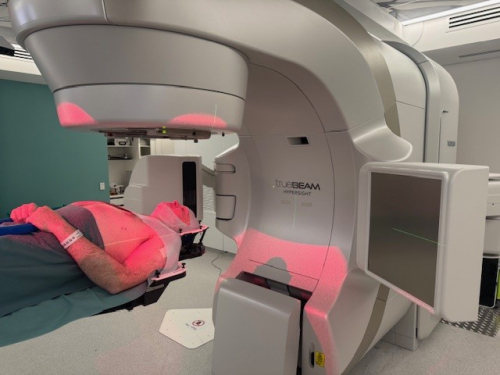Michael’s new role as a dad

Every day our Alfred dads play a vital role in the lives of our patients. But this Father's Day we're recognising the important role that they play at home with their kids. Michael has recently returned from paternity leave were he was full time carer for his now 16-month old daughter, Mia. He's shared what it's like becoming a new dad.
You recently returned to work after parental leave - what was it like?
To be completely honest, I found the transition to becoming a stay at home dad quite difficult. Overnight I went from a confident junior doctor to a completely clueless primary carer of our 8-month-old daughter. Typically our mornings and afternoons involved attending play groups and Mia people watching at the local park or library. During Mia’s nap times, I studied for my specialty exams. As my self-confidence as a father grew, so too did the delight I derived from spending every waking moment with Mia and watching her grow and develop each week.
Why do you think it's important for men to take paternity leave?
I believe paternity leave benefits not only the father, but also the child and the family as a whole. Taking extended parental leave gave me an opportunity to develop a meaningful bond with my daughter, to learn how to identify and respond to her needs, and to develop confidence in myself as a primary care giver. From a practical perspective, my leave allowed my partner to return to work and advance her own medical training. For Mia, I hope this early demonstration of flexible gender roles helps her develop her confidence in a world in which gender stereotypes and inequality continue to be problematic.
Why do you think paternity leave is not more common?
I think there are numerous barriers to more men taking paternity leave. These include social preconceptions regarding the role of fathers in raising children, differential incomes for men and women, and limited paid paternity leave. While more men are relishing the role as stay at home fathers, I think the societal shift to viewing this as completely normal - not just a practical necessity - is in its infancy.
Do you feel there is enough mental health support for new dads?
Until recently postnatal depression for men has not been high on my psychiatric screening radar, even as a psychiatric registrar and father. During this exciting yet often disorientating period, I think it is easy for us to neglect the significant impact that rapid changes in relationship dynamics and role expectations have on men. I hope that through improved resources and education for clinicians, psycho-education for new parents, active screening and proactive public health initiatives, we might bring into focus the potential suffering of vulnerable fathers during this time.
How are you balancing being back at work and being a new dad?
Finding a healthy work-life balance is an ever elusive ambition when working in the public health system. Throw in an energetic toddler, and your odds of success become increasingly slim. That being said, there are a number of strategies I’ve so far found useful in attempting to strike this balance. Firstly, ensuring that I schedule undistracted time before work and on weekends with Mia has been essential in maintaining the relationship we developed over past six months. I’m also learning to put limits on the intrusion of work on my out-of-hours life. Most importantly, my partner and I utilise our support network to schedule time out together and to also support one another in maintaining our fitness and engaging with friends.


